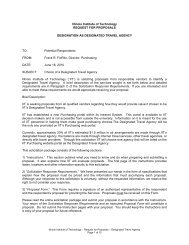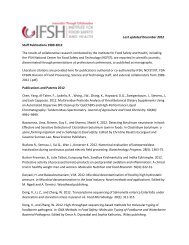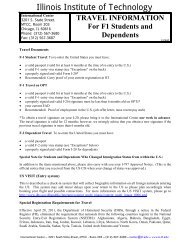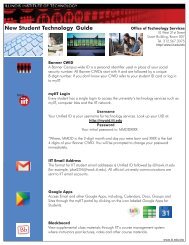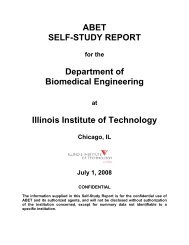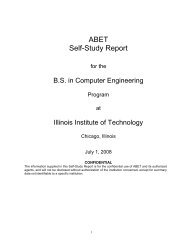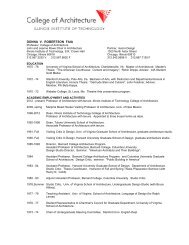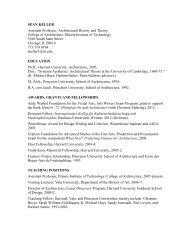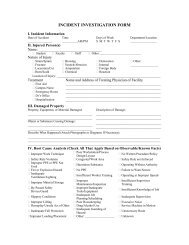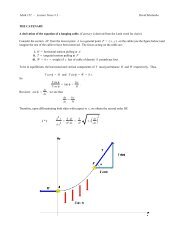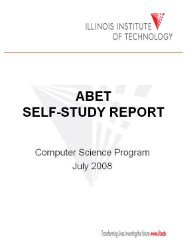Undergraduate Bulletin - Illinois Institute of Technology
Undergraduate Bulletin - Illinois Institute of Technology
Undergraduate Bulletin - Illinois Institute of Technology
Create successful ePaper yourself
Turn your PDF publications into a flip-book with our unique Google optimized e-Paper software.
Course Descriptions<br />
INTM 446<br />
Manufacturing & Logistics Information Systems<br />
This course provides an overview <strong>of</strong> manufacturing and<br />
supply chain information systems, tools, and techniques<br />
utilized for effective decision making. Current state-<strong>of</strong>-the-art<br />
and commercially available industrial s<strong>of</strong>tware packages, such<br />
as MRP, WMS, TMS, APS, etc., will be used and their<br />
impact on management decision making analyzed.<br />
(3-0-3)<br />
INTM 449<br />
Telecommunications Over Data Networks<br />
This course covers a suite <strong>of</strong> application protocols known as<br />
Voice over IP (VoIP). It describes important protocols within<br />
that suite including RTP, SDP, MGCP and SIP, and the<br />
architecture <strong>of</strong> various VoIP installations including on-net to<br />
on-net, on-net to PSTN, and Inter-domain scenarios. The<br />
functions <strong>of</strong> the Network Elements that play significant roles<br />
in this architecture will be defined. Examples <strong>of</strong> network<br />
elements that are currently available as products will be<br />
examined.<br />
Prerequisite(s): [(ITM 440) OR (ITM 540)]<br />
(3-0-3)<br />
INTM 459<br />
Issues in Industrial Sustainability<br />
Examines the concept <strong>of</strong> sustainability and its application in<br />
the industrial environment. Identifies underlying stresses on<br />
natural and human environments and the resultant problems<br />
for business and society including legal, ethical, and political<br />
issues related to sustainability. Global warming, peak oil, and<br />
commodity pricing are considered as indicators <strong>of</strong> the need<br />
for improvements in sustainability. Industrial ecology will<br />
be discussed as well as strategies for developing sustainable<br />
practices in manufacturing, power generation, construction,<br />
architecture, logistics, and environmental quality. Coverage<br />
includes case studies on businesses that have developed<br />
successful sustainability programs.<br />
(3-0-3)<br />
INTM 460<br />
Sustainability <strong>of</strong> Critical Materials<br />
This course explores the limitations in supply and the need<br />
for sustainable use <strong>of</strong> carbon and non-carbon-based materials<br />
such as oil, minerals, food, water, and other natural resources<br />
used by industry. Limitations in the global availability <strong>of</strong><br />
such resources pose challenges to industry which will require<br />
careful consideration and planning to ensure continued prosperity<br />
for current and future generations. Course will cover<br />
strategies and options to mitigate anticipated shortages and<br />
optimize the use <strong>of</strong> non-renewable natural resources, review<br />
<strong>of</strong> fuel and raw material pricing, and cost/benefit analysis<br />
<strong>of</strong> sustainable development proposals. Technical analyses<br />
will be presented during class discussions, but a technical<br />
background is not required.<br />
(3-0-3) (C)<br />
INTM 461<br />
Energy Options for Industry<br />
Carbon-based fuels are a limited resource and within decades<br />
will be in very short supply. Associated energy costs will<br />
increase and industry will be required to incorporate alternate<br />
fuels and/or power sources, such as uranium (for nuclear<br />
power), hydroelectric, geothermal, wind, wave, solar, etc.<br />
This course presents such energy options and explores the<br />
anticipated impact on industry.<br />
(3-0-3) (C)<br />
INTM 462<br />
Special Topics in Sustainability<br />
This course allows the student to research and report on an<br />
industrial sustainability issue <strong>of</strong> interest and relevance to their<br />
career objectives. Topics may touch on industrial ecology,<br />
ethics, regulations, environment, resource use, alternative<br />
manufacturing methods, facilities, logistics, etc. This is the<br />
fourth course in a specialization in Industrial Sustainability.<br />
(0-0-3)<br />
INTM 477<br />
Entrepreneurship in Industry<br />
Introduces various forms <strong>of</strong> entrepreneurship with emphasis<br />
towards industrial organizations. Provides helpful tools for<br />
developing and implementing significant “game-changing”<br />
actions to effect change within an existing organization or<br />
develop a new business venture. Students complete an opportunity<br />
assessment (OPASS) project wherein they identify,<br />
evaluate, and develop an approach for a “real-life” business<br />
and produce a formal report and presentation.<br />
(3-0-3) (C)<br />
INTM 491<br />
<strong>Undergraduate</strong> Research<br />
<strong>Undergraduate</strong> research.<br />
(Credit: Variable)<br />
INTM 497<br />
Special Projects INTM<br />
Special projects.<br />
(Credit: Variable)<br />
Interpr<strong>of</strong>essional Projects<br />
IPRO 397<br />
IPRO I: Interpr<strong>of</strong>essional by Design<br />
The IPRO I course is an immersive, action-oriented, dynamic<br />
learning experience guided by a team <strong>of</strong> instructors from<br />
the fields <strong>of</strong> design, engineering, business, law, architecture,<br />
psychology, and social sciences. IPRO I introduces students<br />
to the interpr<strong>of</strong>essional project concept and its underlying<br />
body <strong>of</strong> knowledge by: incorporating hands-on, small group,<br />
user-centered design projects informed by instructor-lead<br />
discussions and guest speakers; stimulating and facilitating<br />
project idea development that involves a collaborative<br />
innovation process; developing an understanding <strong>of</strong> the socioeconomic<br />
context <strong>of</strong> themed clusters <strong>of</strong> workplace project<br />
possibilities (e.g., venture development, service learning,<br />
process improvement, sustainability, research); and forming<br />
the core <strong>of</strong> an IPRO II team and developing its project<br />
plan. This course has faculty approval through the 2012-2013<br />
academic year.<br />
(1-6-3) (C)<br />
IPRO 497<br />
Interpr<strong>of</strong>essional Project (IPRO)<br />
Interpr<strong>of</strong>essional projects allow students to learn teamwork,<br />
leadership and project management skills, while working<br />
in multidisciplinary teams on projects involving technical,<br />
ethical, environmental, economic, public policy, and legal<br />
issues. IPRO project teams are typically comprised <strong>of</strong> 10-12<br />
students from sophomore through graduate level and from all<br />
disciplines that can contribute to a project. Every effort will<br />
be made to accommodate students’ first choices; however,<br />
it may be necessary to balance students across all projects<br />
scheduled for the semester or to consolidate students into<br />
fewer projects to meet minimum team requirement. Specific<br />
rules about selection <strong>of</strong> IPRO projects may apply to certain<br />
degree programs. Some projects may carry Humanities or<br />
Social Science credit. Students are encouraged to consult the<br />
lead faculty member for the project and their faculty advisor<br />
before registering for a project.<br />
(1-6-3) (C)<br />
227



